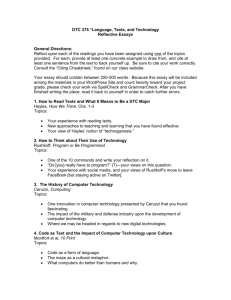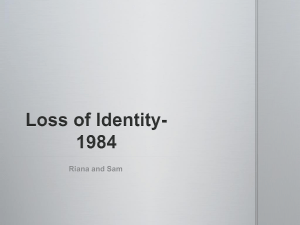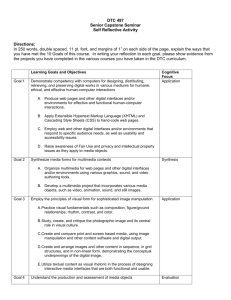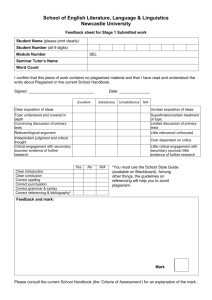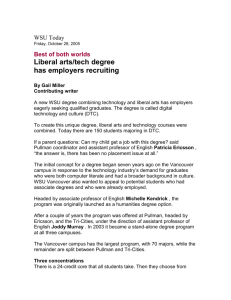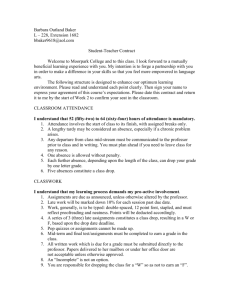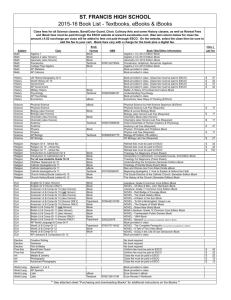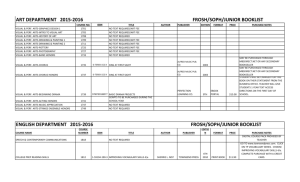DTC 375: Language, Texts and Technology Dr. Dene Grigar Email
advertisement
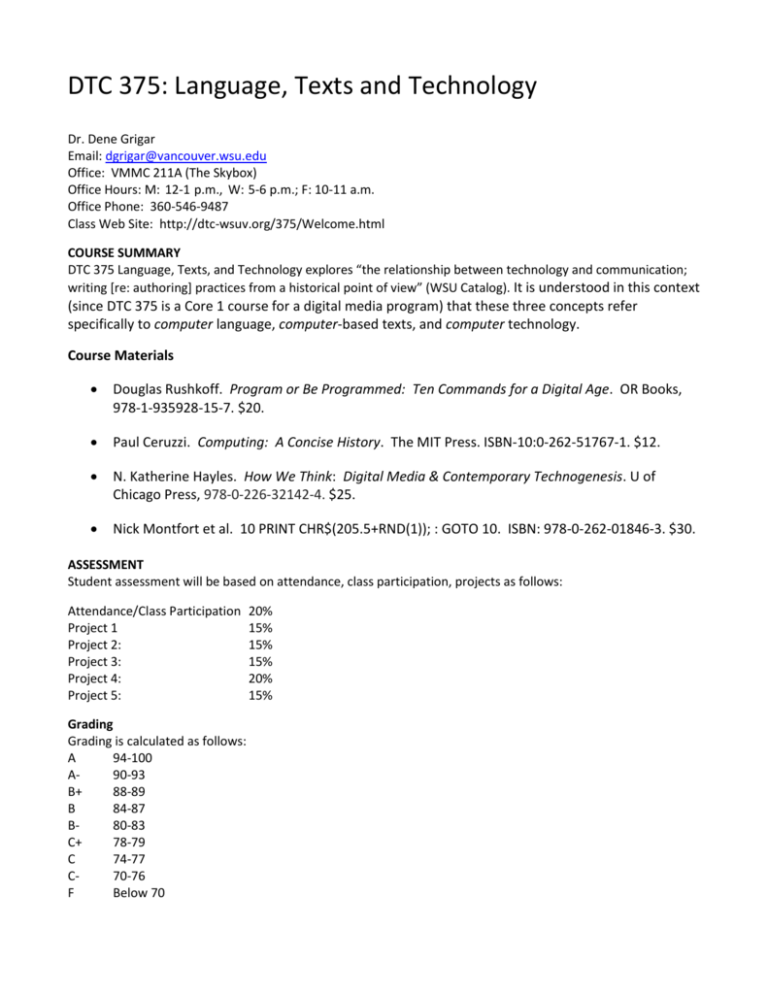
DTC 375: Language, Texts and Technology Dr. Dene Grigar Email: dgrigar@vancouver.wsu.edu Office: VMMC 211A (The Skybox) Office Hours: M: 12-1 p.m., W: 5-6 p.m.; F: 10-11 a.m. Office Phone: 360-546-9487 Class Web Site: http://dtc-wsuv.org/375/Welcome.html COURSE SUMMARY DTC 375 Language, Texts, and Technology explores “the relationship between technology and communication; writing [re: authoring] practices from a historical point of view” (WSU Catalog). It is understood in this context (since DTC 375 is a Core 1 course for a digital media program) that these three concepts refer specifically to computer language, computer-based texts, and computer technology. Course Materials Douglas Rushkoff. Program or Be Programmed: Ten Commands for a Digital Age. OR Books, 978-1-935928-15-7. $20. Paul Ceruzzi. Computing: A Concise History. The MIT Press. ISBN-10:0-262-51767-1. $12. N. Katherine Hayles. How We Think: Digital Media & Contemporary Technogenesis. U of Chicago Press, 978-0-226-32142-4. $25. Nick Montfort et al. 10 PRINT CHR$(205.5+RND(1)); : GOTO 10. ISBN: 978-0-262-01846-3. $30. ASSESSMENT Student assessment will be based on attendance, class participation, projects as follows: Attendance/Class Participation Project 1 Project 2: Project 3: Project 4: Project 5: Grading Grading is calculated as follows: A 94-100 A90-93 B+ 88-89 B 84-87 B80-83 C+ 78-79 C 74-77 C70-76 F Below 70 20% 15% 15% 15% 20% 15% Attendance Attendance is required. Every two days of unexcused absence results in final grade being lowered by one letter grade. University policy regarding excused illness is followed. Participation It is obvious when students do not come to class prepared or do not participate in class. Coming to class having read the material, taking notes when appropriate, contributing to class discussion, showing up with assignments ready to go, turning in assignments on time, and attending the time set aside for the final exam are expected. Doing homework for another class or fooling around on email or Facebook, etc. means you are not participating in class. You will be asked to leave the class if you are not prepared or not participating. LEARNING OBJECTIVES This course specifically addresses three of the 10 goals established for the Digital Technology and Culture degree. Students who successfully complete this class will be able to: • Appreciate the history of technological development, from local to global perspectives, and its implications for a variety of mediums (DTC Goal 8). • Recognize various forms of language processing and their implications for media authoring (DTC Goal 7). • Be practiced and capable communicators in all media (DTC Goal 10). Students will develop these competencies through a combination of assigned readings, individual and group projects, peer-to-peer learning, class lectures and interaction, and hands on media content creation. At the end of this course, Course topics that This outcome will be students should be able address these learning evaluated primarily to: outcomes: by : University Learning Goals CMDC Learning Goals & Objectives 1. Critical & Creative Thinking Define, analyze, and solve problems. Philosophical Grounding Assess the accuracy and Technology validity of findings and conclusions. Texts Understand how one thinks, reasons, and makes value judgments, including ethical and aesthetical judgments. Combine and synthesize existing ideas, images, or expertise in original ways. Think, react, and work in Language an imaginative way characterized by a high degree of innovation, divergent thinking, and Net Culture risk taking. Integrate and synthesize knowledge from multiple sources. Assigned Exercises: Goal 8 Appreciate the history of technological development, from local to global perspectives, and its implications for a variety of mediums Research into author and texts assigned Synthesis paper of all texts read for the course Production of iBook for the course; multimedia created/selected for iBook 4. Information Literacy Determine the extent Development of an Development of a Goal 7 Recognize various and type of information iBook for the course audio project book forms of language processing needed. using Audacity and their implications for Production/selection media authoring Implement wellof multimedia Creation of a video designed search content for the iBook project using Final strategies. to reflect readings Cut Goal 8 Appreciate the history and ideas of technological Access information Production of a development, from local to effectively and Group discussion via graphic novel global perspectives, and its efficiently from Facebook and using Comic Life implications for a variety of multiple sources. Twitter mediums Assess credibility and applicability of information sources. Use information to accomplish a specific purpose. 5. Communication Preparation for giving a formal presentation Recognize how Access and use circumstances, information background,ethically values, and legally. interests, and needs Interacting with shape communication guest speakers (i.e. sent and received. Douglas Rushkoff) Formal presentation Production of an iBook Five written Tailor messages to the Working in teams on assignments audience. projects Express concepts Production of bios, propositions, and summaries and other beliefs in coherent, forms of writing for concise, and technically each assigned text correct form. Writing for social Choose appropriate media communication medium and technology. Speak with comfort in front of groups. Follow social norms for individual and small group interactions, which includes listening actively. Goal 10 Be practiced and capable communicators in all mediums 7. Depth, Breadth, and Integration of Learning Through study in the sciences and mathematics, social sciences, humanities, histories, languages, and the arts. Looking at the each Final presentation of the three areas— Research project language, text, and Participation in technology—in discussions detail as they move from print-based to electronic contexts, By showing a depth of as well as bringing knowledge within the them all together chosen academic field into the single lens of study based on of human expression integration of its history, core methods, techniques, vocabulary, and unsolved problems. Goal 8 Appreciate the history of technological development, from local to global perspectives, and its implications for a variety of mediums By applying the concepts of the general and specialized studies to personal, academic, service learning, professional, and/or community activities. By understanding how the methods and Writing Resources concepts of the chosen discipline relate to Writing represents thinking. You are expected, at this point in your academic career, to write at the college those of other level. Please take care with your work. All students are encouraged to take advantage of the Writing Center. disciplines and by possessing the ability Deadlines to engage cross-noted. Late assignments will not be accepted. Assignments due by start of class,inunless disciplinary activities. ACADEMIC INTEGRITY / PLAGIARISM Plagiarism (claiming another person’s work as your own) or fabricating research will not be tolerated. Anyone who submits false work, violates the academic integrity policy or cheats in any other way, will fail the assignment in question and possibly the course as well as be reported to the school’s administration, the Office of Student Conduct, for further discipline, including possible expulsion. Some students may not be clear on what constitutes plagiarism, here is a breakdown of the various types: 1. Failing to use proper citation style for material you borrow, accidentally. (This constitutes either a Category A or B offense). 2. Cutting and pasting parts of a webpage or borrowing passages from a book for your paper without properly citing these parts and claiming the material as your own for the expressed intent of cheating. (This constitutes a Category C offense). 3. Buying papers, borrowing papers, or recycling former papers unrevised and claiming these types of papers as your own for your assignment in this course. (This constitutes a Category C offense). Here is the how plagiarism is dealt with the first time a student is caught: Category A: Sloppiness. Automatic “0” on paper, with option to rewrite for no better than a “C” Category B: Ignorance. Automatic “0” on paper, with option to rewrite for no better than a “C” Category C: Obvious Conscious Cheating. Automatic “0” on paper, with no option for rewriting Students caught plagiarizing a second time will be asked to leave the class and will receive an automatic “0” in the course. Academic integrity is the cornerstone of the university and will be strongly enforced in this course. For additional information about WSUV’s Academic Integrity policy / procedures contact 360-546-9781. DISABILITY ACCOMMODATION Accommodations may be available if you need them in order to fully participate in this class because of a disability. Accommodations may take some time to implement, so it is critical that you contact Disability Services as soon as possible. All accommodations must be approved through Disability Services, located in the Student Resource Center on the lower level of the Student Services Center 360-546-9138. EMERGENCY NOTIFICATION SYSTEM WSU has made an emergency notification system available for faculty, students and staff. Please register at myWSU with emergency contact information (cell, email, text, etc). You may have been prompted to complete emergency contact information when registering for classes on RONet. In the event of a building evacuation, a map at each classroom entrance shows the evacuation point for each building. Please refer to it. Finally, in case of class cancellation campus-wide, please check local media, the WSU Vancouver web page and/or http://www.flashalert.net/. Individual class cancellations may be made at the discretion of the instructor. Each individual is expected to make the best decision for their personal circumstances, taking safety into account.
